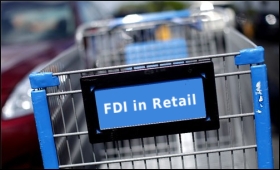|

|
Indian cos likely to face non-tariff barriers in retail FDI: Experts
|
|

|
|
| Top Stories |
 |
|
|
|
Namrata Kath Hazarika | 30 Apr, 2013
With the opening up of Foreign Direct Investment (FDI) in multi-brand retail, there will be an increase of Non Tariff Barriers that can be imposed by the big foreign retailers to their Indian suppliers, observed industry experts.
"There are very specific requirements that foreign buyers are imposing on Indian suppliers. And, this takes place in context of exports but would now take place in terms of domestic retailing as well," replying to a question asked in this context Abhijit Das, Head & Professor Center for WTO Studies, IIFT said to SME Times during an event organized by Fair Trade Forum (FTF) in New Delhi.
The government had allowed 51 percent FDI in multi brand retail and increased FDI limit in single brand retail from 49 per cent to 100 per cent. And, 30 percent of all raw materials have to be procured from the small and medium enterprises.
Non Tariff Barriers (NTBs) are defined as a form of restrictive trade where barriers to trade are set up and take a form other than a tariff. It includes quotas, levies, embargoes, sanctions, and among others.
Explaining further on NTBs on the retail sector, Das also said, "For example, suppose a big garment retailer comes into India and says we will buy from those sellers in India who have air conditioned in their factories. How many Indian sellers will be able to meet that requirement? There are very few of them. That in a way becomes a non-tariff barrier for the Indian seller for not been able to sell to foreign retailers."
There are many foreign companies who maintain a detailed check lists before procuring goods from suppliers, he said.
According to the experts, these type of non tariff barriers can become a challenge for the artisans, farmers and their Small and medium companies. To address such adverse situations, there should be proper information sharing and capacity building. More support and resources are required from the side of the government.
In a way to obtain supportive environment to address NBTs, it is essential to have fair trade producers whose livelihood and trade operations are relatively in lower scale, they said.
Pankaj Mehndiratta, Consultant, Tara Projects (Fair Trade Organization) also said that SMEs in this case are facing many challenges. Not only in retail industry, there are many companies in the export front that are trying to cope up with this scenario.
Highlighting the challenges further, he added that issues of Price Control, Quality Control, Distribution Restriction, Intellectual Property Rights, Social compliances are not relevant to Indian context; labeling and packaging requirement, Traceability requirement and other restrictive regulation are creating immense trouble for SMEs.
In fact, NTBs many times clashes with the prospects of market access of small producers as NTBs are often used to control trade or refuse opportunities in trade. The producers at the grassroots levels and SMEs attached to them generally work with limited resources and less information flow. Hence they become more vulnerable to the negative impacts of NTBs, the experts also added.
|
|
|
| |
|
|
|
|
|
|
|
|
|
|
|
|
|
|
| |
| Customs Exchange Rates |
| Currency |
Import |
Export |
US Dollar
|
66.20
|
64.50 |
UK Pound
|
87.50
|
84.65 |
Euro
|
78.25
|
75.65 |
| Japanese
Yen |
58.85 |
56.85 |
| As on 13 Aug, 2022 |
|
|
| Daily Poll |
 |
 |
| PM Modi's recent US visit to redefine India-US bilateral relations |
|
|
|
|
|
| Commented Stories |
 |
|
|
|
|
|
| |
|